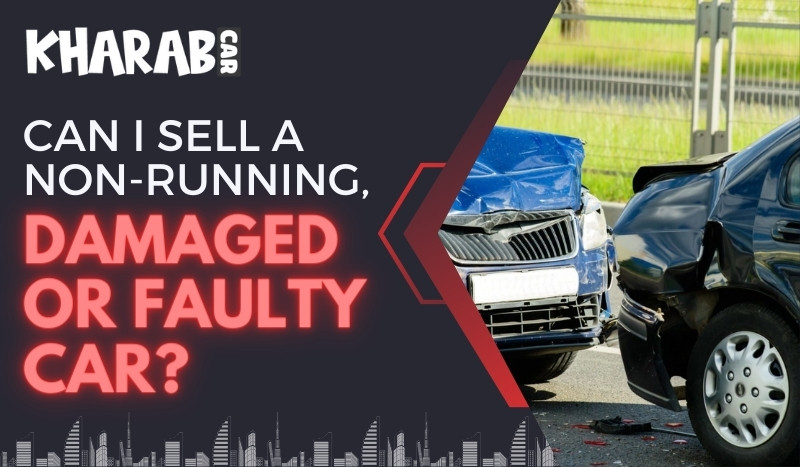Transferring ownership of the car to the buyer requires the V5C logbook, just like in any other car transaction. For the new owner's piece of mind, it pays to have the invoice for the work done on your automobile if it was deemed a category S or N write-off and you had it repaired. This also holds true for whatever auto repairs you've completed.
- Barsha Heights - Dubai
- info@kharabcar.com
- +971 55 722 7700
Can I Sell a Non-Running, Damaged or Faulty Car?

Can I Sell a Non-Running, Damaged or Faulty Car?
This tutorial will walk you through the steps of selling a non-running, damaged car and show you how to receive the best price. See everything you should know by reading on.
What is A Non-Running Car?
An automobile that is incapable of propulsion or simply refuses to start is considered non-running. Since cars are intricate vehicles, there could be a variety of causes, such as a damaged engine or significant structural damage following an accident.
You can either get it fixed, sell it as damaged, or scrap it if your vehicle won't start.
Should I Fix My Car that Won't Start?
Consider the car's market value in its current condition, the cost of repairs, and if it can be driven again before selecting the best course of action. But, if you decide to repair up your non-runner, you should speak with a certified mechanic first. You can get an estimate from them for the required repairs.
It can be completed quickly and affordably if the automobile only requires minor repairs, a new battery, or engine tuning to get it working again. However, you should sell your non-running car if the time and cost of repairs prevent you from making a profit when you sell it.
You should also know if your non-runner may be restored to roadworthy condition if the insurance company has written it off.
Insurance write-offs in categories are only suitable for crushing or components. In this case, your only options are to sell or scrap.
Categorised S indicates that there is structural damage to the car and that professional repair is required. Since that will be costly, you should sell your car for scrap if you can't still make money on it.
Although they may not be able to be driven, vehicles with a grade of Category N have not experienced structural damage. Once more, you'll want professional guidance before making a decision.
Where Can I Sell My Automobile that Won't Start?
Finding out the value of your non-running car should be your next step after deciding to sell it. To receive a ballpark estimate of the amount you should expect to receive for the automobile, do some market research and obtain a car value from any dealers or car-buying agencies.
Finding a place to sell it is the next step, and you may be shocked to hear that there are a few possibilities available for non-running cars.
Auction
One possibility is to sell the car at auction; however, since the vehicle is undrivable, a salvage sale is likely a better choice than a regular auto auction. You will typically have to pay a seller's fee and arrange for transportation of your non-runner to the auction house.
Private Buyer
It can be more difficult to sell a non-runner car to a private buyer. Most potential purchasers will be put off since they will have to make arrangements for it to be transported away. But, there will be car buyers out there who will desire your car if you are open and truthful about the vehicle and its condition.
Dealership
Another option is to attempt selling used cars to a dealership. Your car may be viewed as a positive investment if it is easily fixable since in-house mechanics can swiftly (and affordably) get it back up and running. However, it's likely that you'll need to show it to a number of dealers before receiving an offer.
Throw Away
Your non-runner might also be sold for scrap. A scrap merchant will give your car a different value depending on its weight as a lump of metal and some of its basic materials, such as textiles and plastics, even if it might not be worth anything to a driver.
FAQs
Transferring ownership of the car to the buyer requires the V5C logbook, just like in any other car transaction. For the new owner's piece of mind, it pays to have the invoice for the work done on your automobile if it was deemed a category S or N write-off and you had it repaired. This also holds true for whatever auto repairs you've completed.
